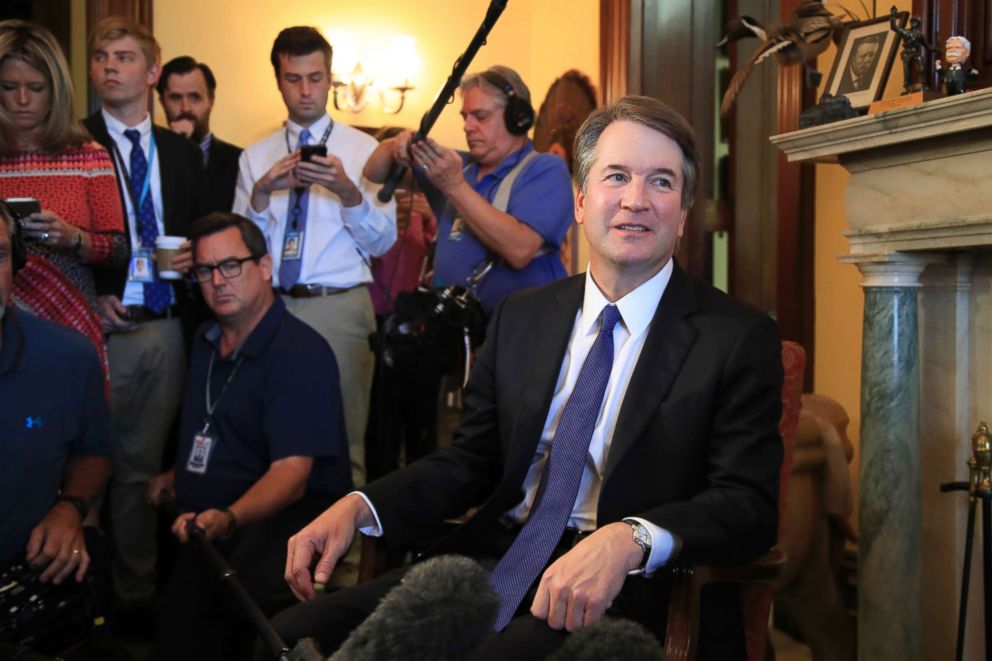Democratic coalition targets moderate GOP senators in SCOTUS fight
The coalition hopes to sway GOP moderates to fend off Democratic defections.
Capitol Hill -- Senate Democrats and a newly-minted coalition of allied progressive interest groups have launched a coordinated campaign to oppose Judge Brett Kavanaugh, President Trump’s Supreme Court nominee, that includes highlighting the stakes for average Americans on key issues such as health care and abortion rights.
But it’s not just an effort to unite Democrats against the nominee.
Their unusual strategy, according to multiple senior Democratic strategists, is to apply as much pressure as possible on two moderate Republican senators - Susan Collins of Maine and Alaska’s Lisa Murkowski - as a way to not only possibly sink the nomination but to keep vulnerable red-state Democrats from supporting the nominee.
The thinking is that if either Republican announces her support early, vulnerable Democrats might more easily follow suit, seeing that their vote would not be decisive.
The longer any final decision takes, the strategy goes, the more time groups including Demand Justice, NARAL, MoveOn.org, Center for American Progress, and Planned Parenthood have to fire up their base and persuade their vulnerable incumbents to oppose the nomination.
“We have an important task ahead of us. We need to unite our Democratic caucus as quickly as possible so that we can put the maximum amount of pressure on trying to flip Susan Collins or Lisa Murkowski,” Brian Fallon, head of Demand Justice, told ABC’s Powerhouse Politics podcast Wednesday.
Jesse Lee of the Center for American Progress said the coalition’s blueprint for the fight is the success Democrats had in derailing a GOP effort to repeal the Affordable Care Act (ACA) versus their failure in galvanizing opposition to this year’s tax cut legislation.
“This, too, is about taking something away,” Lee said, referring to Democrats’ plan to highlight what they see as a likelihood that Kavanaugh might vote to essentially dismantle ACA or upend abortion rights in some fashion, either by voting to overturn Roe v. Wade or in favor of allowing states to pass legislation that makes it all but impossible for a woman to obtain an abortion.
The message to the Collins and Murkowski, Lee said, is, “This won’t play out way down the road. This is going to happen while you’re in office. This isn’t just about today’s kabuki theater.”

Lee said Democrats will also focus on Kavanaugh's expansive view of presidential power and will - to a lesser extent - shine a light on corporate greed, attempting to tie in Kavanaugh's past opposition to the Consumer Financial Protection Bureau. This, along with the focus on health care and abortion, Democrats are hoping, will excite the base - which could be a boon to red-state Democrats, as well.
So, Collins and Murkowski now find themselves on the receiving end of TV and social media ads, grassroots lobbying and more, as the fight is brought to their doorstep. Collins’ office has even received wire coat hangers as a reminder of the grisly ends to which some women in the past went to end a pregnancy.
But one senior Republican strategist told ABC News he thought the campaign was doomed to fail, saying, “Red-state Democrats are under far more pressure. Collins and Murkowski aren’t up for re-election, and they’ve survived far worse than this could ever be. Plus, Collins has never voted against a Supreme Court nominee.”
To be sure, the pressure is intense on those Democrats up for re-election in November in states President Trump won handily, primarily Heidi Heitkamp of North Dakota, West Virginia’s Joe Manchin, and Joe Donnelly of Indiana.
All three voted for Trump’s first Supreme Court pick, Neil Gorsuch.
Freshman Democratic Sen. Doug Jones, who won his seat in a highly-contested race in conservative Alabama, is also a target of some Democratic efforts, though some strategists believe he might be less inclined to support Kavanaugh over civil rights concerns. Jones is a former career prosecutor who touted his civil rights wins during his insurgent campaign.
The new Democratic coalition is fighting an uphill battle against their GOP adversaries.
Republicans have long used judiciary nominations as ground zero to galvanize the base, and their machine is a well-funded one. They, too, are spending big to target Manchin, Heitkamp, Donnelly, and Jones.
Judicial Crisis Network is up now with a $1.4 million ad buy on national cable and digital in Alabama, Indiana, North Dakota and West Virginia, and the group’s chief counsel, Carrie Severino, tells ABC News, “We’re prepared to spend whatever it takes.” Asked if that could be as high as $10 million, the group’s budget for the Gorsuch nomination, Severino said, “Absolutely.
The Republican National Committee has also prepared its own massive plan ahead of Kavanaugh's confirmation primarily focusing on states that President Trump won in 2016 where there is a Democratic Senator up for re-election, according to the plan obtained by ABC News.
The effort includes a war room-like operation with "SCOTUS specific phone and door scripts" and digital ad buys with targeted social media posts.
“We have the largest field program we’ve ever had, and we’re using it to take Judge Kavanaugh’s confirmation fight directly to voters. If Senate Democrats want to obstruct this immensely qualified judge to appeal to their base, we’ll make sure their constituents hold them accountable this November," RNC Chairwoman Ronna McDaniel said in a statement.
Manchin, for his part, said no amount of pressure will affect him, and he will not be swayed by any decision by his GOP counterparts. “I get no pressure. Zilch,” Manchin said. “I’ve been here eight years. And Susan and Lisa are my friends, but I don’t work that way. They do their thing. I do mine.”
The senator said he plans to hold town hall meetings in his home state to gauge public opinion, along with a thorough reading of research on the nominee and an eventual one-on-one sit-down with Kavanaugh.
But Manchin did note that health care is a top concern. He said he wants to know if the nominee will protect insurance coverage for those with pre-existing conditions, noting that some 88,000 of his constituents would be affected if that protection went away.
Likewise, Heitkamp said the pressure campaign would fail on her.
“I think anyone who thinks that pressuring Lisa or Susan will work doesn’t know those two women very well,” the senator said, noting that she would make her own decision based on her research and meeting the nominee.
Time, however, is something that the Democratic coalition could have on its side.
Both Collins and Murkowski are known for meticulously researching a nominee, and both have said this time will be no different. And though Sen. Collins indicated this week that she finds the judge well-qualified, an aide to the moderate senator said she was not stating a position either way on the nominee. No tea leaves to read there, though everyone has been trying.




